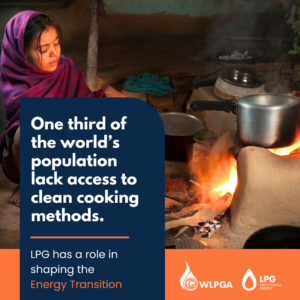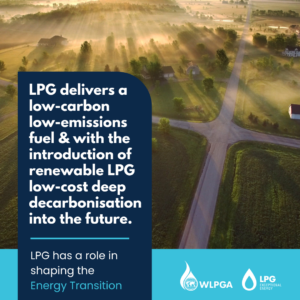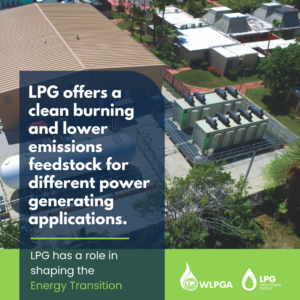The Role of LPG in Shaping the Energy Transition By James Rockall, CEO & Managing Director, WLPGA
 In the face of escalating climate change concerns and the urgent need to transition to cleaner energy sources, liquefied petroleum gas (LPG) emerges as a powerful ally in our quest for a sustainable future. LPG's versatility offers a range of applications that can significantly reduce greenhouse gas emissions, improve air quality, and support global decarbonisation efforts. The development of renewable molecules like renewable propane and renewable and recycled carbon DME (referred to as Renewable Liquid Gas) can further enhance the potential of the LPG industry in creating a lower carbon energy landscape.
In the face of escalating climate change concerns and the urgent need to transition to cleaner energy sources, liquefied petroleum gas (LPG) emerges as a powerful ally in our quest for a sustainable future. LPG's versatility offers a range of applications that can significantly reduce greenhouse gas emissions, improve air quality, and support global decarbonisation efforts. The development of renewable molecules like renewable propane and renewable and recycled carbon DME (referred to as Renewable Liquid Gas) can further enhance the potential of the LPG industry in creating a lower carbon energy landscape.
LPG's adaptability is its key strength, making it an invaluable resource across various sectors. As a clean cooking fuel, LPG can replace traditional biomass and coal, mitigating indoor air pollution and improving the health and well-being of millions worldwide. With approximately one third of the world's population lacking access to clean cooking methods and relying on polluting fuels, the use of LPG can have a significant positive impact by reducing household air pollution and preventing an estimated 3.8 million premature deaths annually, surpassing the total number of deaths from the COVID-19 pandemic in 2021.
Furthermore, LPG serves as a suitable alternative energy source for industries such as road transport, power generation, industrial processes, agriculture, and maritime transport. The consumption of Autogas (LPG used for vehicles) has been steadily increasing, with 27.2 million tonnes consumed and 27.8 million Autogas vehicles in 2019. Investing in Autogas presents an attractive solution, particularly for cities aiming to ban diesel vehicles and countries lacking sufficient infrastructure for electrification of transportation.
LPG also plays a significant role in power generation, acting as a bridging fuel in countries with limited natural gas infrastructure, and as a backup for intermittent renewable power sources. LPG power generators address electricity supply constraints and enhance energy security while reducing greenhouse gas emissions and increasing air quality. The industrial and agricultural sectors can also benefit from transitioning to LPG, achieving carbon emission reductions of 30-40% by using LPG instead of coal and 20% by using LPG instead of oil.
The maritime industry, responsible for around 3% of global greenhouse gas emissions, can benefit from LPG as a low-emission alternative to traditional fuels. LPG emits significantly less sulphur oxides, nitrogen oxides, and particulate matter compared to these fuels, while also reducing carbon emissions. Studies have shown that LPG in maritime applications can also result in substantial fuel cost savings.
Additionally, combining LPG with renewables in hybrid systems allows for the integration of clean energy sources such as solar and wind. By leveraging LPG's clean-burning properties and its ability to serve as a backup energy source, hybrid systems can achieve a higher penetration of renewable energy while ensuring reliable and continuous energy supply.
While LPG already offers significant environmental benefits, the development of Renewable Liquid Gas can further enhance our sustainable energy future. By deriving liquid gas from renewable feedstocks such as biomass, bio-waste, or advanced sustainable processes, we can achieve a greater reduction in greenhouse gas emissions and enhance the overall sustainability of the LPG industry. This transition to Renewable Liquid Gas not only addresses climate change concerns, but also fosters the development of a circular economy, minimising waste and promoting resource efficiency.
In conclusion, LPG represents a versatile and sustainable solution for deep decarbonisation across various sectors. Its potential in clean cooking, road transport, power generation, industry, agriculture, and maritime transport positions it as an ideal alternative to high-carbon fossil fuels. By embracing LPG and Renewable Liquid Gas, countries at all stages of development can make significant strides towards achieving a sustainable and low-carbon future without the need for extensive investments in new infrastructure.
For more on LPG’s role in the energy transition, visit https://www.worldliquidgas.org/publication/lpgs-role-in-the-energy-in-transition/



